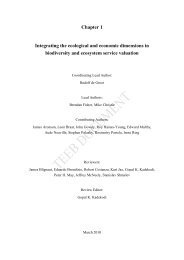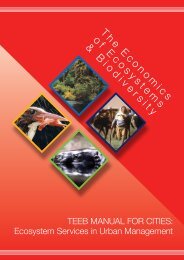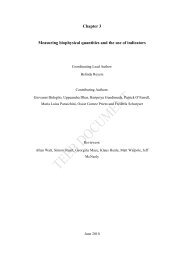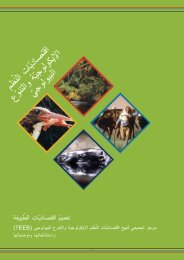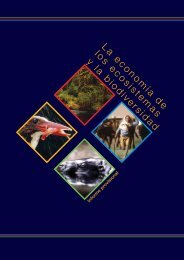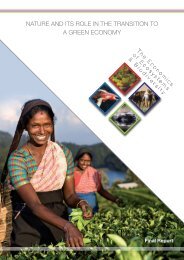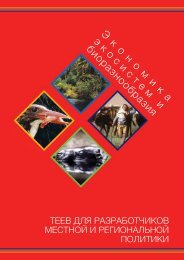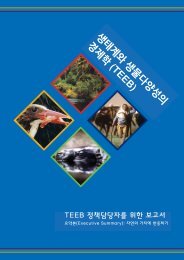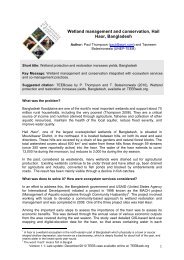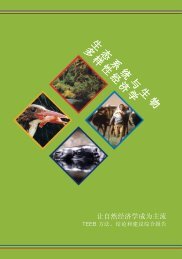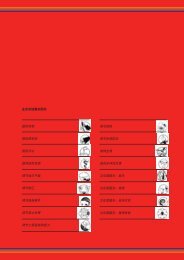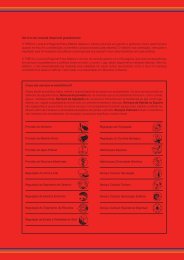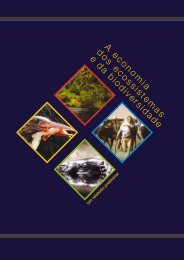- Page 1 and 2: Part I: The need for action Ch1 The
- Page 3 and 4: ThE EcoNoMIcs of EcosysTEMs AND BIo
- Page 5 and 6: THE GLOBAL BIODIVERSITY CRISIS AND
- Page 7 and 8: THE GLOBAL BIODIVERSITY CRISIS AND
- Page 9 and 10: 1.2 THE GLOBAL BIODIVERSITY CRISIS
- Page 11 and 12: • Enough food could be produced o
- Page 13: MArINE sysTEMs THE GLOBAL BIODIVERS
- Page 17 and 18: 1.2.3 WHAT IS DRIVING THESE LOSSES?
- Page 19 and 20: THE GLOBAL BIODIVERSITY CRISIS AND
- Page 21 and 22: THE GLOBAL BIODIVERSITY CRISIS AND
- Page 23 and 24: THE GLOBAL BIODIVERSITY CRISIS AND
- Page 25 and 26: THE GLOBAL BIODIVERSITY CRISIS AND
- Page 27 and 28: THE GLOBAL BIODIVERSITY CRISIS AND
- Page 29 and 30: 1.4 THE GLOBAL BIODIVERSITY CRISIS
- Page 31 and 32: THE GLOBAL BIODIVERSITY CRISIS AND
- Page 33 and 34: EfErENcEs THE GLOBAL BIODIVERSITY C
- Page 35 and 36: THE GLOBAL BIODIVERSITY CRISIS AND
- Page 37 and 38: Part I: The need for action Ch1 The
- Page 39 and 40: THE ECONOMICS OF ECOSYSTEMS AND BIO
- Page 41 and 42: 10.1 WHY VALUING ECOSYSTEM SERVICES
- Page 43 and 44: RESPONDING TO THE VALUE OF NATURE B
- Page 45 and 46: RESPONDING TO THE VALUE OF NATURE B
- Page 47 and 48: RESPONDING TO THE VALUE OF NATURE B
- Page 49 and 50: 10.2.2 BETTER LINKS TO MACRO- ECONO
- Page 51 and 52: 10.3 Investing in natural capital s
- Page 53 and 54: as well as the value for money and
- Page 55 and 56: Global National or Regional Local T
- Page 57 and 58: RESPONDING TO THE VALUE OF NATURE B
- Page 59 and 60: 10.4 By taking distributional issue
- Page 61 and 62: has origins and impacts beyond bord
- Page 63 and 64: The ‘Nobel Prize’*-winning econ
- Page 65 and 66:
10.5 Biodiversity and ecosystem ser
- Page 67 and 68:
Rewarding the provision of services
- Page 69 and 70:
Making this a reality will require
- Page 71 and 72:
GHK, CE and IEEP - GHK, Cambridge E
- Page 73 and 74:
Torras, M. (2000) The Total Economi
- Page 75 and 76:
Part I: The need for action Ch1 The
- Page 77 and 78:
ThE ECoNoMICS of ECoSySTEMS AND BIo
- Page 79 and 80:
FRAMEWORK AND GUIDING PRINCIPLES FO
- Page 81 and 82:
FRAMEWORK AND GUIDING PRINCIPLES FO
- Page 83 and 84:
FRAMEWORK AND GUIDING PRINCIPLES FO
- Page 85 and 86:
FRAMEWORK AND GUIDING PRINCIPLES FO
- Page 87 and 88:
2.3 FRAMEWORK AND GUIDING PRINCIPLE
- Page 89 and 90:
FRAMEWORK AND GUIDING PRINCIPLES FO
- Page 91 and 92:
FRAMEWORK AND GUIDING PRINCIPLES FO
- Page 93 and 94:
FRAMEWORK AND GUIDING PRINCIPLES FO
- Page 95 and 96:
2.3.4 BASE POLICIES ON GOOD GOVERNA
- Page 97 and 98:
2.4 FRAMEWORK AND GUIDING PRINCIPLE
- Page 99 and 100:
REfERENCES FRAMEWORK AND GUIDING PR
- Page 101 and 102:
Part I: The need for action Ch1 The
- Page 103 and 104:
THE ECONOMICS OF ECOSYSTEMS AND BIO
- Page 105 and 106:
STRENGTHENING INDICATORS AND ACCOUN
- Page 107 and 108:
3.1 STRENGTHENING INDICATORS AND AC
- Page 109 and 110:
STRENGTHENING INDICATORS AND ACCOUN
- Page 111 and 112:
STRENGTHENING INDICATORS AND ACCOUN
- Page 113 and 114:
STRENGTHENING INDICATORS AND ACCOUN
- Page 115 and 116:
STRENGTHENING INDICATORS AND ACCOUN
- Page 117 and 118:
STRENGTHENING INDICATORS AND ACCOUN
- Page 119 and 120:
STRENGTHENING INDICATORS AND ACCOUN
- Page 121 and 122:
STRENGTHENING INDICATORS AND ACCOUN
- Page 123 and 124:
STRENGTHENING INDICATORS AND ACCOUN
- Page 125 and 126:
3.3 STRENGTHENING INDICATORS AND AC
- Page 127 and 128:
STRENGTHENING INDICATORS AND ACCOUN
- Page 129 and 130:
3.4 STRENGTHENING INDICATORS AND AC
- Page 131 and 132:
STRENGTHENING INDICATORS AND ACCOUN
- Page 133 and 134:
STRENGTHENING INDICATORS AND ACCOUN
- Page 135 and 136:
3.5 STRENGTHENING INDICATORS AND AC
- Page 137 and 138:
STRENGTHENING INDICATORS AND ACCOUN
- Page 139 and 140:
STRENGTHENING INDICATORS AND ACCOUN
- Page 141 and 142:
Endnotes STRENGTHENING INDICATORS A
- Page 143 and 144:
STRENGTHENING INDICATORS AND ACCOUN
- Page 145 and 146:
STRENGTHENING INDICATORS AND ACCOUN
- Page 147 and 148:
STRENGTHENING INDICATORS AND ACCOUN
- Page 149 and 150:
STRENGTHENING INDICATORS AND ACCOUN
- Page 151 and 152:
Chapter 4: Integrating ecosystem an
- Page 153 and 154:
INTEGRATING ECOSYSTEM AND BIODIVERS
- Page 155 and 156:
4.1 INTEGRATING ECOSYSTEM AND BIODI
- Page 157 and 158:
INTEGRATING ECOSYSTEM AND BIODIVERS
- Page 159 and 160:
INTEGRATING ECOSYSTEM AND BIODIVERS
- Page 161 and 162:
INTEGRATING ECOSYSTEM AND BIODIVERS
- Page 163 and 164:
INTEGRATING ECOSYSTEM AND BIODIVERS
- Page 165 and 166:
INTEGRATING ECOSYSTEM AND BIODIVERS
- Page 167 and 168:
4.3 INTEGRATING ECOSYSTEM AND BIODI
- Page 169 and 170:
INTEGRATING ECOSYSTEM AND BIODIVERS
- Page 171 and 172:
INTEGRATING ECOSYSTEM AND BIODIVERS
- Page 173 and 174:
INTEGRATING ECOSYSTEM AND BIODIVERS
- Page 175 and 176:
INTEGRATING ECOSYSTEM AND BIODIVERS
- Page 177 and 178:
INTEGRATING ECOSYSTEM AND BIODIVERS
- Page 179 and 180:
4.4 INTEGRATING ECOSYSTEM AND BIODI
- Page 181 and 182:
Endnotes INTEGRATING ECOSYSTEM AND
- Page 183 and 184:
INTEGRATING ECOSYSTEM AND BIODIVERS
- Page 185 and 186:
Economic valuation methods INTEGRAT
- Page 187 and 188:
ANNEx 2: sTAGEs of A PoLIcy AssEssM
- Page 189 and 190:
Chapter 5: Rewarding benefits throu
- Page 191 and 192:
REWARDING BENEFITS THROUGH PAYMENTS
- Page 193 and 194:
REWARDING BENEFITS THROUGH PAYMENTS
- Page 195 and 196:
5.1 REWARDING BENEFITS THROUGH PAYM
- Page 197 and 198:
REGULATORY BASELINES AND ADDITIONAL
- Page 199 and 200:
REWARDING BENEFITS THROUGH PAYMENTS
- Page 201 and 202:
REWARDING BENEFITS THROUGH PAYMENTS
- Page 203 and 204:
REWARDING BENEFITS THROUGH PAYMENTS
- Page 205 and 206:
REWARDING BENEFITS THROUGH PAYMENTS
- Page 207 and 208:
REWARDING BENEFITS THROUGH PAYMENTS
- Page 209 and 210:
REWARDING BENEFITS THROUGH PAYMENTS
- Page 211 and 212:
5.2 REWARDING BENEFITS THROUGH PAYM
- Page 213 and 214:
REWARDING BENEFITS THROUGH PAYMENTS
- Page 215 and 216:
could have adverse consequences for
- Page 217 and 218:
REWARDING BENEFITS THROUGH PAYMENTS
- Page 219 and 220:
REWARDING BENEFITS THROUGH PAYMENTS
- Page 221 and 222:
REWARDING BENEFITS THROUGH PAYMENTS
- Page 223 and 224:
5.3 REWARDING BENEFITS THROUGH PAYM
- Page 225 and 226:
• some contained an element of te
- Page 227 and 228:
• ancillary provisions e.g. possi
- Page 229 and 230:
5.4 REWARDING BENEFITS THROUGH PAYM
- Page 231 and 232:
5.4.2 GREENING INTERGOVERNMEN- TAL
- Page 233 and 234:
financial flows involved. Building
- Page 235 and 236:
considerable patience as such optio
- Page 237 and 238:
CERTIFICATION OF SUSTAINABLE FISHER
- Page 239 and 240:
REWARDING BENEFITS THROUGH PAYMENTS
- Page 241 and 242:
While certification systems can sig
- Page 243 and 244:
REWARDING BENEFITS THROUGH PAYMENTS
- Page 245 and 246:
5.6 REWARDING BENEFITS THROUGH PAYM
- Page 247 and 248:
REWARDING BENEFITS THROUGH PAYMENTS
- Page 249 and 250:
REWARDING BENEFITS THROUGH PAYMENTS
- Page 251 and 252:
Endnotes REWARDING BENEFITS THROUGH
- Page 253 and 254:
44 http://www.mekongtourism.org/sit
- Page 255 and 256:
REWARDING BENEFITS THROUGH PAYMENTS
- Page 257 and 258:
REWARDING BENEFITS THROUGH PAYMENTS
- Page 259 and 260:
REWARDING BENEFITS THROUGH PAYMENTS
- Page 261 and 262:
Chapter 6: Reforming Subsidies Chap
- Page 263 and 264:
REFORMING SUBSIDIES Key Messages of
- Page 265 and 266:
6 Chapter 6 addresses the need for
- Page 267 and 268:
6.1.2 HOW BIG ARE EXISTING SUBSIDIE
- Page 269 and 270:
6.2 6.2.1 DISTINGUISHING BETWEEN
- Page 271 and 272:
through provision of water and ener
- Page 273 and 274:
6.3 6.3.1 AGRICULTURE Subsidies to
- Page 275 and 276:
Box 6.4: The EU Common Agricultural
- Page 277 and 278:
Second, it has to be borne in mind
- Page 279 and 280:
• increases the producer price of
- Page 281 and 282:
REFORMING SUBSIDIES Box 6.9: Removi
- Page 283 and 284:
In the agriculture sector, the pric
- Page 285 and 286:
Some consumer energy subsidies may
- Page 287 and 288:
6.4 “People who love soft methods
- Page 289 and 290:
6.4.2 RESISTANCE TO CHANGE Subsidie
- Page 291 and 292:
The multiple policy objectives ofte
- Page 293 and 294:
REFORMING SUBSIDIES Social impacts
- Page 295 and 296:
The G-20 Heads of State have recent
- Page 297 and 298:
REFERENCES Agnew, D.J.; Pearce, J.;
- Page 299 and 300:
OECD - Organisation for Economic Co
- Page 301 and 302:
Bernd hansjürgens, Christoph Schr
- Page 303 and 304:
Key Messages of Chapter 7 Rewarding
- Page 305 and 306:
7.1 BASIC PRINCIPLES FoR hALTING oN
- Page 307 and 308:
7.2 REGULATING To AvoID DAMAGE: ENv
- Page 309 and 310:
y reducing the release of pollutant
- Page 311 and 312:
y reducing uncertainties with respe
- Page 313 and 314:
This equivalence can involve the sa
- Page 315 and 316:
PoTENTIAL BENEFITS oF oFFSETS AND B
- Page 317 and 318:
A biodiversity offset should be des
- Page 319 and 320:
7.4 SETTING MoRE ACCURATE PRICES: M
- Page 321 and 322:
Market-based instruments can be des
- Page 323 and 324:
China’s first water use rights sy
- Page 325 and 326:
PoTENTIAL CoST SAvINGS ThRoUGh MBIS
- Page 327 and 328:
Despite the potential described abo
- Page 329 and 330:
Non-market valuation studies can he
- Page 331 and 332:
PoLLUTIoN AND oThER DAMAGING ACTIvI
- Page 333 and 334:
The 1973 CITES treaty (Convention o
- Page 335 and 336:
7.6 MAKING IT hAPPEN - PoLICy MIxES
- Page 337 and 338:
has shown the critical need to stre
- Page 339 and 340:
Gutman, P. and Davidson, S. (2007)
- Page 341:
Part I: The need for action Ch1 The
- Page 372 and 373:
· ·· · · · · · · · · ·
- Page 391:
T H E E C O N O M I C S O F E C O S



